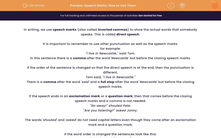In writing, we use speech marks (also called inverted commas) to show the actual words that somebody speaks. This is called direct speech.
It is important to remember to use other punctuation as well as the speech marks.
For example:
"I live in Brighton," said Tom.
In this sentence, there is a comma after the word 'Brighton' but before the closing speech marks.

If the order of the sentence is changed so that the direct speech is at the end, then the punctuation is different.
Tom said, "I live in Brighton."
There is a comma after the word 'said' and a full stop after the word 'Brighton' but before the closing speech marks.
If the speech ends in an exclamation mark or a question mark, then that comes before the closing speech marks and a comma is not needed.
"Go away!" shouted Pete.
"Are you listening?" asked Jonny.
The words 'shouted' and 'asked' do not need capital letters even though they come after an exclamation mark and a question mark.
If the word order is changed, the sentences look like this:
Pete shouted, "Go away!"
Jonny asked, "Are you listening?"

The first word of the direct speech always begins with a capital letter even if it is not the start of the sentence.
It is common in books for a single speech mark to be used instead of two. This is done on your keyboard by using the apostrophe key.
Pete shouted, 'Go away!'
Want a bit more help with this before you begin? Why not watch this short video?







